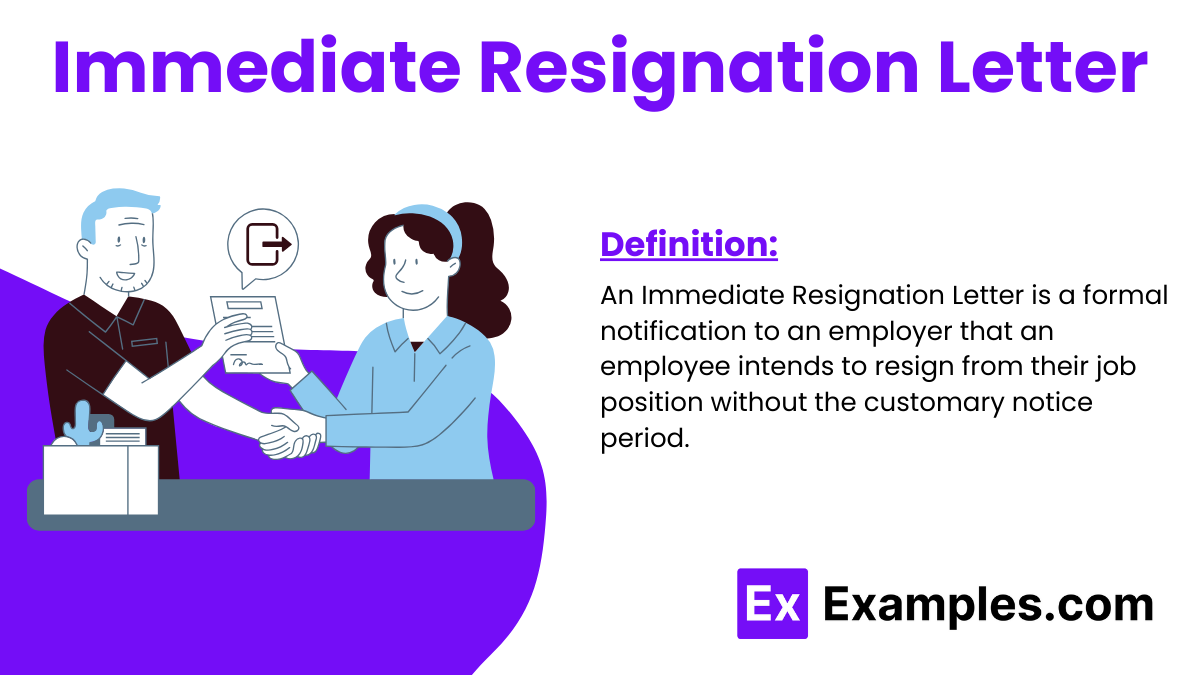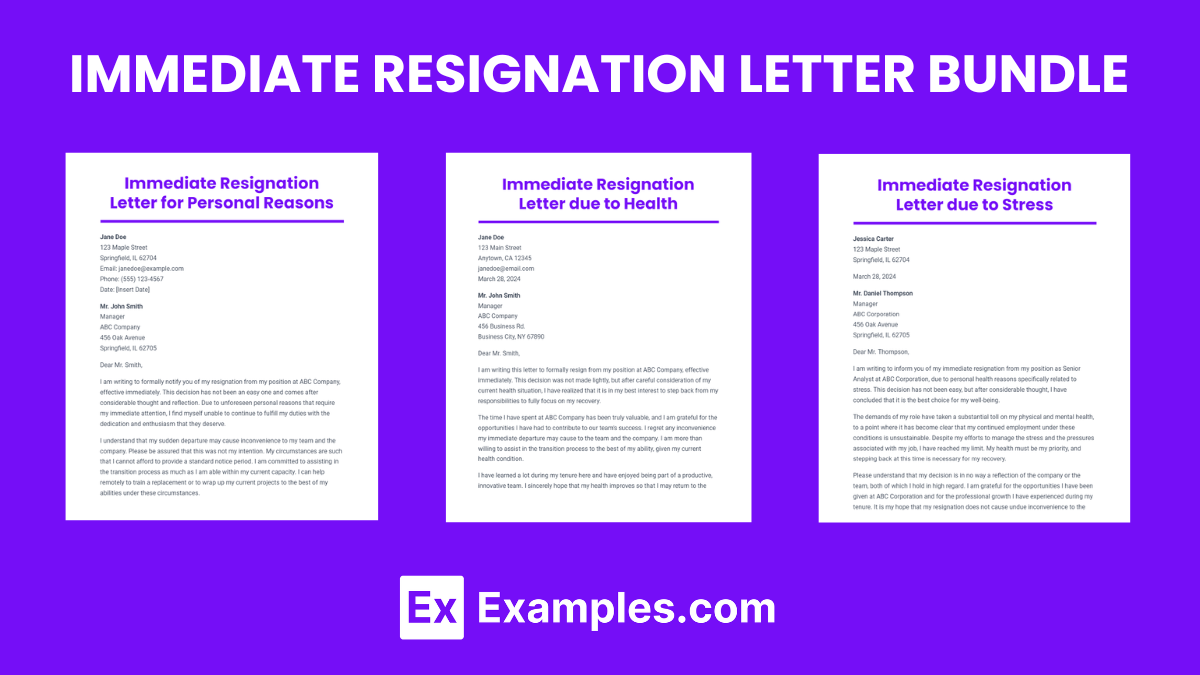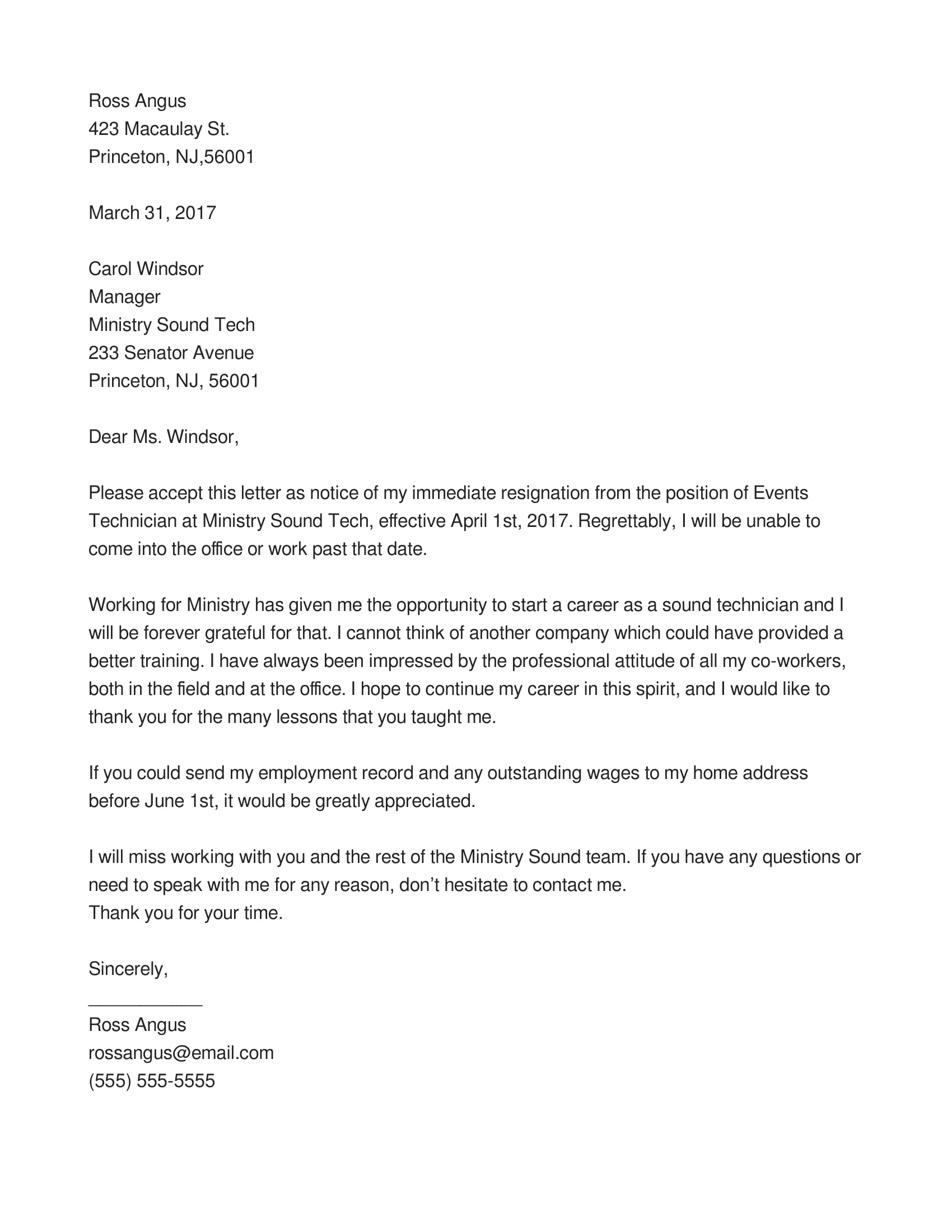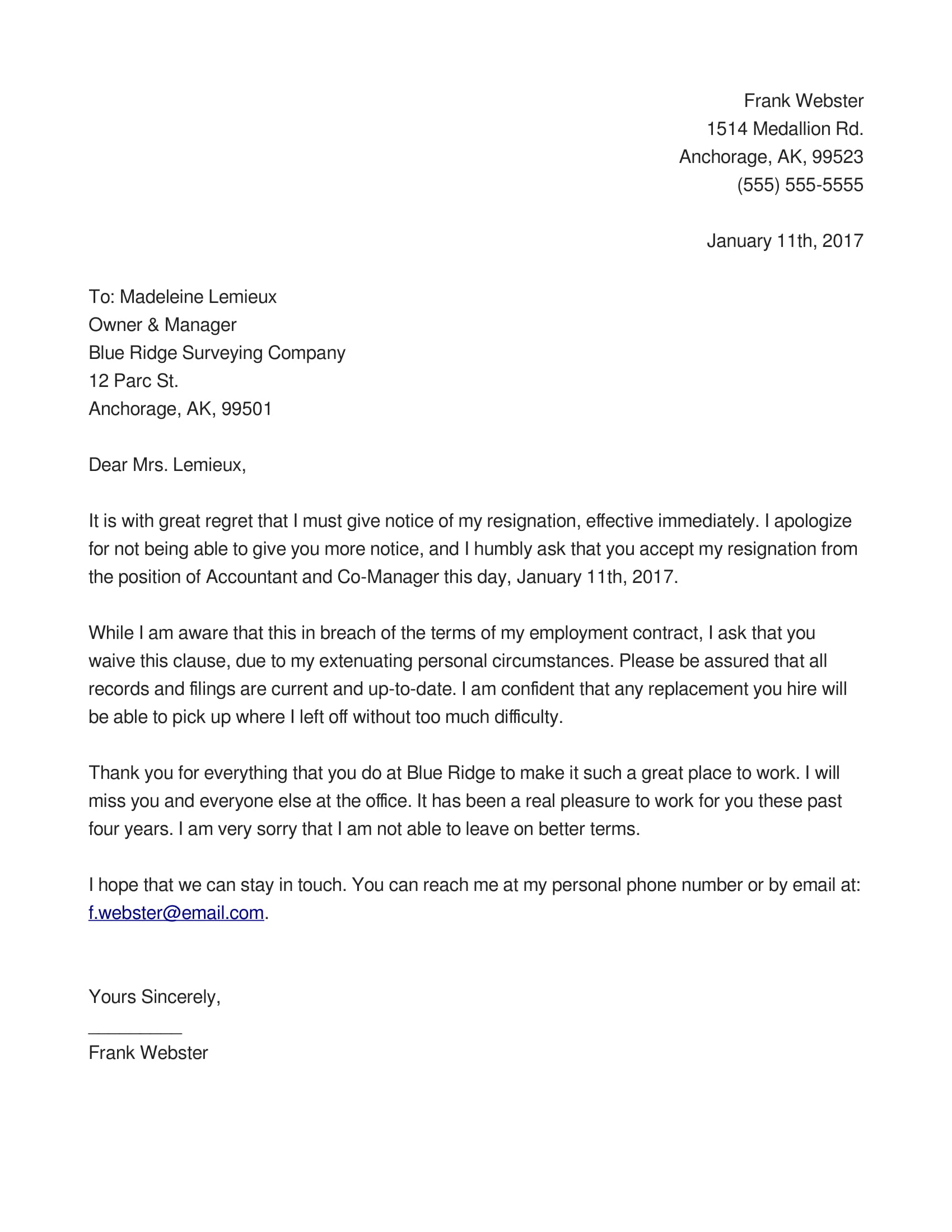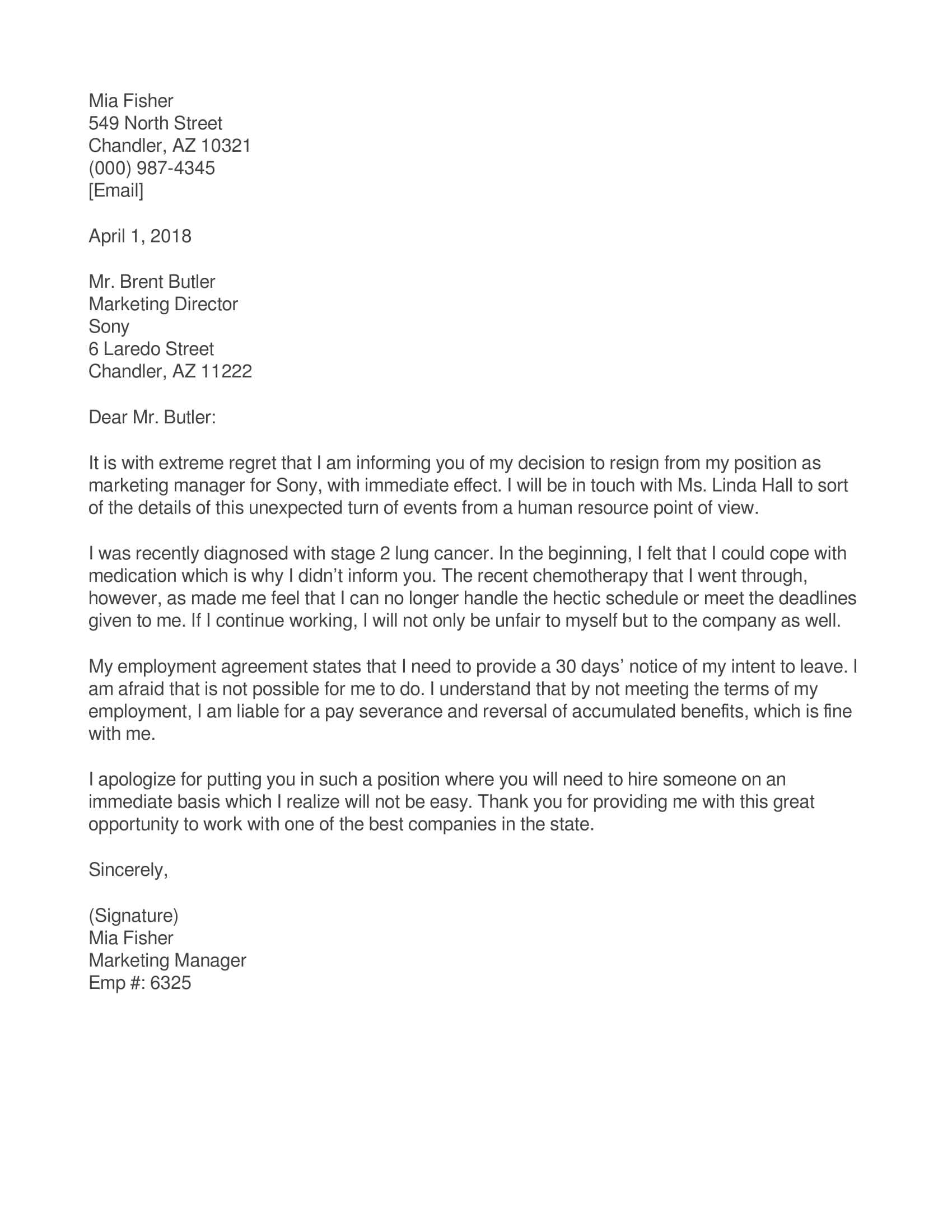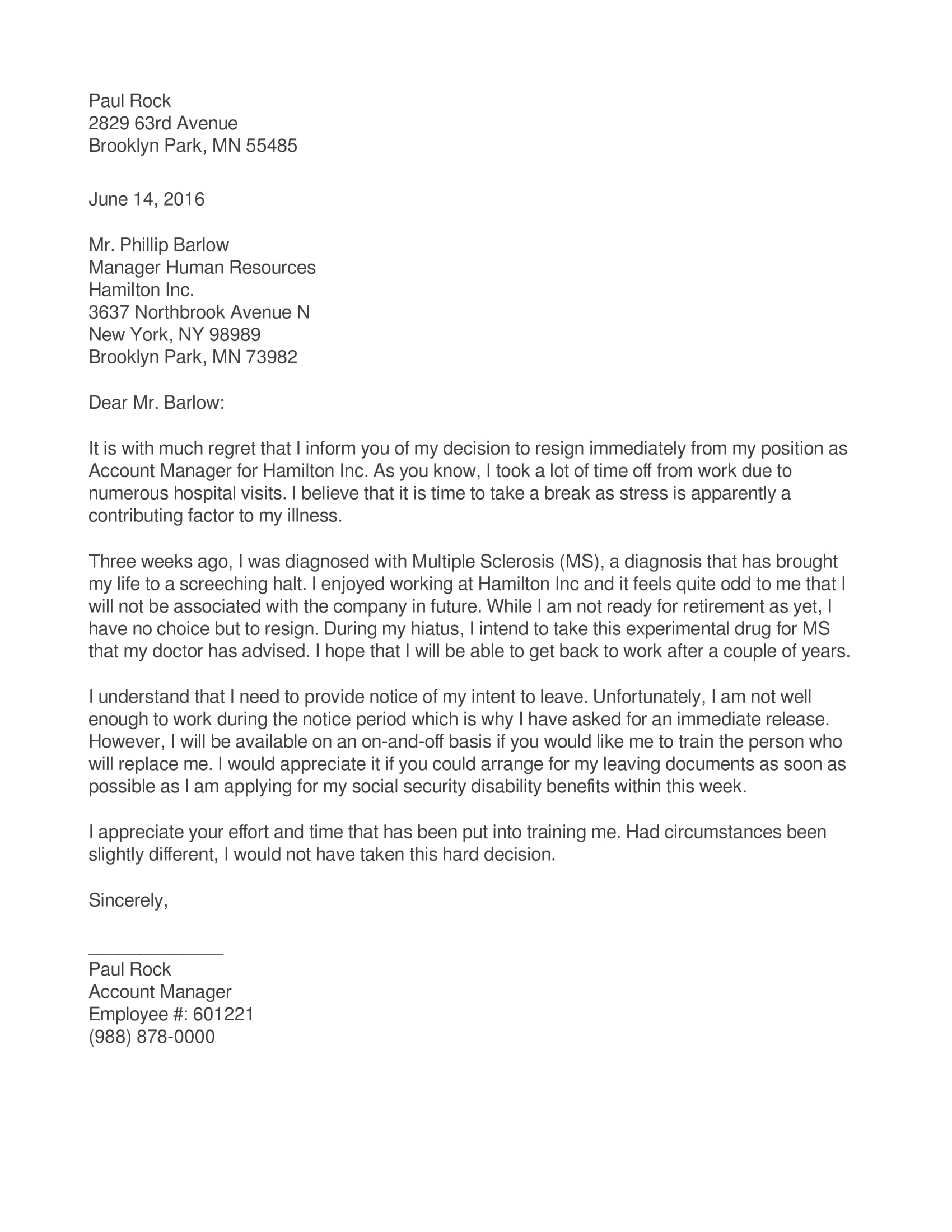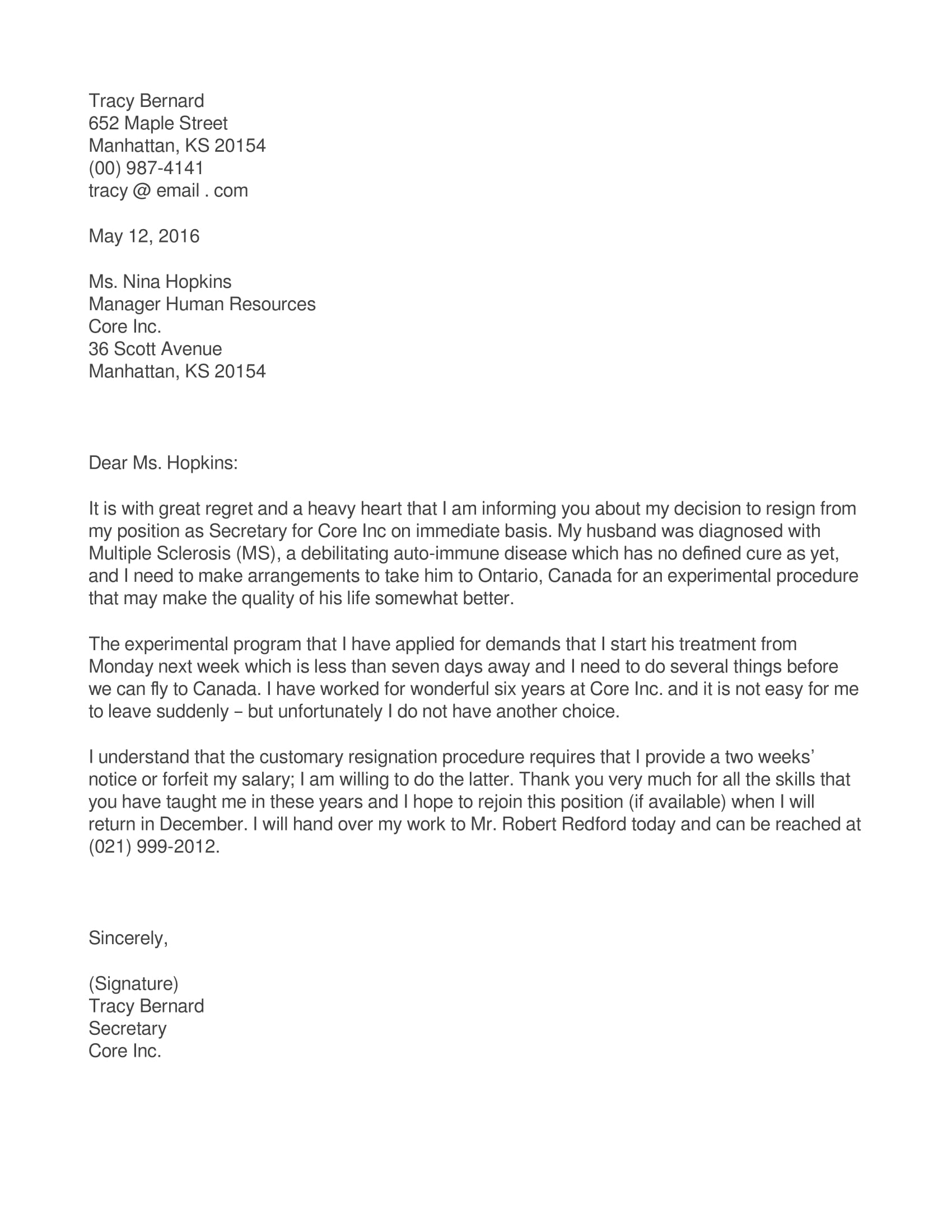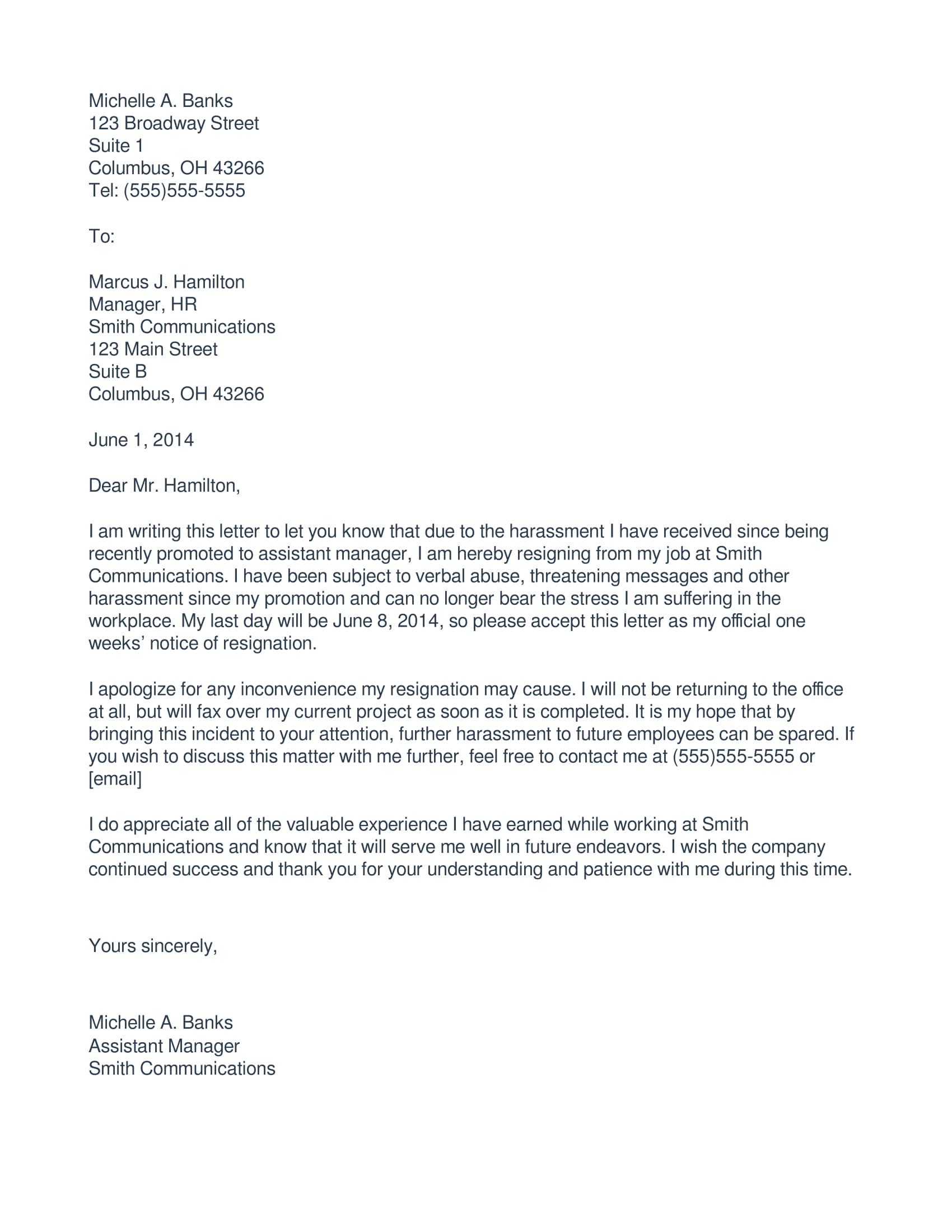25+ Immediate Resignation Letter Examples to Download
There are certain circumstances that prompt you to leave a job even if you love it dearly. It can be because of countless reasons, for example, health issues, relocation or a long family vacation. Although sometimes it can also be because of personal reasons concerning the working environment itself. Whatever the reason behind an immediate resignation, you must always aim to leave professionally and respectfully. You may also see official resignation letter examples.
The perfect way to resign from a job is to give a two weeks notice and to offer assistance for the transitional process. However, that may not be the case in every situation. It may not be ideal but the intervention of certain circumstances cause you to immediately leave the job you are currently employed in. Since you still need to leave a positive last impression, you need to submit a well-written resignation letter.
What is an Immediate Resignation Letter?
An Immediate Resignation Letter is a formal notification to an employer that an employee intends to resign from their job position without the customary notice period. Unlike standard resignation letters, which typically include a two-week notice to allow for a smooth transition, an immediate resignation letter is used in situations where the employee feels unable to continue working for any period of time beyond the current day.
Download This Immediate Resignation Letter Bundle
Immediate Resignation Letter Format
[Your Full Name]
[Your Job Title]
[Company Name]
[Company Address]
[City, State, Zip]
[Email Address]
[Phone Number]
[Today’s Date]
[Recipient’s Name (optional)]
[Recipient’s Title (optional)]
[Company Name]
[Company Address]
[City, State, Zip]
Dear [Recipient’s Name or “Management Team”],
I am writing to formally notify you of my resignation from [Company Name], effective immediately. Due to unforeseen circumstances, I am unable to provide a standard notice period.
I sincerely apologize for the inconvenience my immediate departure may cause to the team and the organization. I am committed to assisting with the transition of my responsibilities so as to minimize any impact. Please let me know how I can help during this time.
I would like to express my gratitude for the opportunities for professional and personal development that you have provided me during my time at [Company Name]. I have enjoyed working for the company and appreciate the support provided to me during my tenure.
Thank you for your understanding. I wish the company all the best and hope to maintain a positive relationship moving forward.
Sincerely,
[Your Full Name]
[Your Job Title]
Reasons for Writing an Immediate Resignation Letter
Step 1: Start with Your Contact Information
Begin your letter by listing your contact information at the top, including your name, position, employer’s name, address, email, and phone number. Follow this with the date of writing the letter.
Step 2: Add the Recipient’s Details
If possible, address the letter to your direct supervisor or the HR manager, including their name, title, and company address.
Step 3: Write a Clear Resignation Statement
Start the body of your letter with a clear statement of your intent to resign immediately. It’s important to be straightforward and direct, avoiding any ambiguity about your decision.
Step 4: Explain (Briefly) Your Reason for Immediate Resignation
While you’re not obligated to provide a detailed explanation, offering a brief reason can help maintain a positive relationship with your employer. Be honest but diplomatic, focusing on the necessity rather than delving into negative details.
Step 5: Offer Assistance with the Transition
Even though you’re leaving immediately, offering to help with the transition demonstrates professionalism and goodwill. Suggest ways you might be able to ease the handover process, such as training a replacement or documenting your current projects.
Step 6: Express Gratitude
Thank your employer for the opportunities and experiences you’ve had during your tenure. A positive note of appreciation can help leave a good lasting impression.
Step 7: Close with a Professional Sign-off
End your letter with a polite closure, such as “Sincerely” or “Best regards,” followed by your name and signature (if submitting a hard copy).
Why Do you need Immediate Resignation Letter?
An Immediate Resignation Letter is necessary for several reasons, emphasizing the importance of formal communication even in urgent situations.
- Formal Notification: Provides an official record of your intention to resign, ensuring that there is no ambiguity about your departure from the company.
- Professional Courtesy: Even in urgent situations, it’s important to maintain professionalism. An immediate resignation letter helps preserve your professional reputation and relationships.
- Legal and Administrative Clarity: Serves as a formal document that can be important for HR records, ensuring that both parties are clear on the terms and timing of your departure.
- Explanation of Circumstances: Although not required, the letter can offer a brief explanation for your immediate departure, which may help in maintaining a positive relationship with your employer.
- Opportunity for Assistance: It allows you to offer help in transitioning your responsibilities, which can reduce the impact of your sudden departure on the company.
- Closure: Provides a sense of closure for both you and the employer, allowing for a clean break from the company.
- Future References: A respectful and professionally written resignation letter can be beneficial if you need a reference from your employer in the future.
What to Do When It is Necessary to Resign without Notice?
Resigning without notice can be a challenging situation, both emotionally and professionally. However, there are instances when it becomes necessary due to personal reasons, emergencies, or untenable work conditions. Here’s what to do when you find yourself in such a situation:
1. Consider All Options
- Explain: Before deciding to resign immediately, consider if there’s a possibility to explain your situation to your employer. Sometimes, discussing the issue may lead to temporary leave arrangements or solutions you hadn’t considered.
2. Prepare a Resignation Letter
- Professionalism: Even in urgent situations, prepare a formal immediate resignation letter. This document should respectfully communicate your decision, possibly offer a brief explanation (if you are comfortable doing so), and express gratitude for the opportunity to work there.
3. Schedule a Meeting with Your Supervisor
- Direct Communication: If possible, request a private meeting with your supervisor to hand in your resignation letter. This gesture allows you to maintain professionalism and leaves room for an open, respectful dialogue.
4. Offer to Assist in the Transition
- Support: Though you’re leaving immediately, offering your support to hand over tasks or document your current projects can help ease the transition and maintain positive relationships.
5. Understand the Consequences
- Awareness: Be aware of the potential consequences of resigning without notice, including the impact on your professional reputation, future job opportunities, and any legal implications based on your employment contract.
6. Prepare for an Immediate Exit
- Readiness: Sometimes, you may be asked to leave immediately after resigning. Prepare for this possibility by organizing your personal items and work documents beforehand.
7. Seek Legal Advice if Necessary
- Protection: If you’re resigning due to harassment, discrimination, or any legal issue, consulting with a legal professional can provide guidance on how to protect yourself and whether you have grounds for a claim.
8. Update Your Resume and Start Job Searching
- Next Steps: Begin updating your resume and start looking for new job opportunities immediately. Use networking and job boards to find positions that match your skills and career goals.
9. Reflect on Your Experience
- Growth: Use this experience as an opportunity for personal and professional growth. Reflect on what you’ve learned and how you can apply these lessons in your next role.
Tips to Write Immediate Resignation Letter
- Be Concise and Clear: State your resignation directly and clearly at the beginning of the letter. Avoid lengthy explanations or unnecessary details about your departure.
- Maintain Professionalism: Regardless of the reasons for leaving, keep the tone of your letter professional and respectful. This helps preserve relationships and your professional reputation.
- Express Gratitude: Include a sentence or two expressing gratitude for the opportunity to work at the company, highlighting any positive experiences or learnings you’ve had.
- Offer a Reason, Briefly: If comfortable, provide a brief reason for your immediate resignation (e.g., personal reasons, health issues). There’s no need for extensive details.
- Offer to Assist: If possible, offer to help with the transition. This could involve training a replacement, documenting your current projects, or other support within the limited timeframe.
- Avoid Negativity: Refrain from including negative comments about the company, colleagues, or your experience. Focus on the future and leaving on a positive note.
- Keep It Private: Before submitting your resignation, decide who in the organization should be the first to know. Typically, this would be your direct supervisor.
- Proofread: Review your letter for any typos or grammatical errors. A well-written letter reflects your professionalism.
- Prepare for Immediate Departure: Be ready for the possibility that you may be asked to leave immediately upon resigning. Organize your personal items and work documents accordingly.
- Seek Legal Advice if Necessary: If resigning due to unlawful treatment or if you have a contractual obligation you’re concerned about, consider consulting with a legal professional before submitting your resignation.
- Plan Your Announcement: Consider how and when you’ll communicate your resignation to colleagues, if appropriate, after speaking with your supervisor.
Immediate Resignation Letter Samples
- Immediate Resignation Letter for Personal Reasons
- Immediate Resignation Letter due to Health
- Immediate Resignation Letter due to Stress
- Immediate Resignation Letter without Notice
- Immediate Resignation Letter for New Job
- Immediate Resignation Letter for Better Opportunity
- Immediate Resignation Letter for Personal Reasons without Notice
- Immediate Resignation Letter for Family Emergency
- Immediate Resignation Letter for Toxic Work Environment
- Immediate Resignation Letter for Career Change
Free Immediate Resignation Letter Template
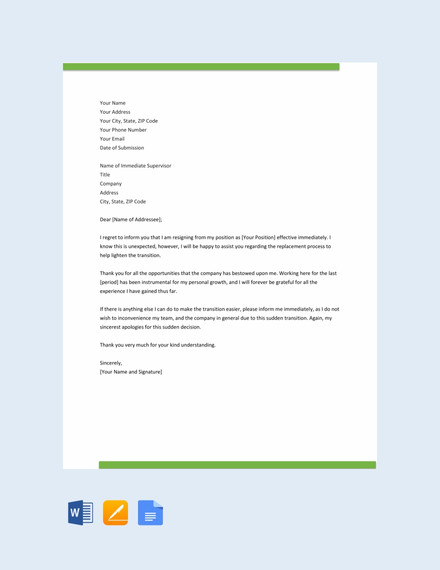
Immediate Resignation Letter Due to Illness Template
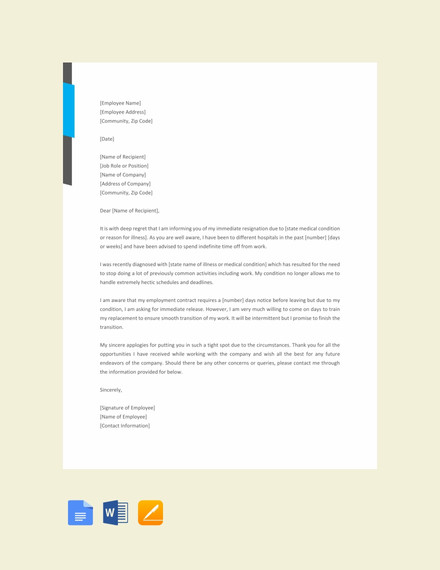
Simple Resignation Letter Template
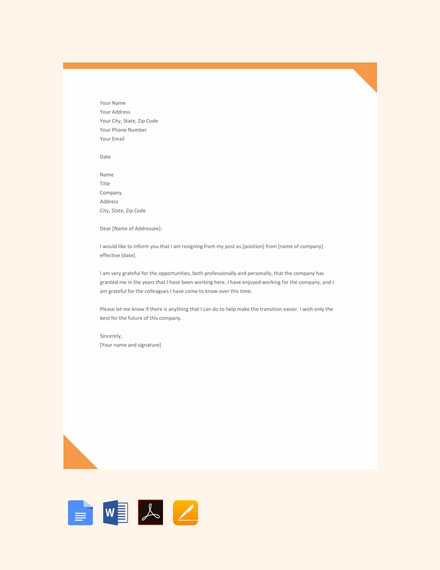
Immediate Resignation Letter Due to Stress Template
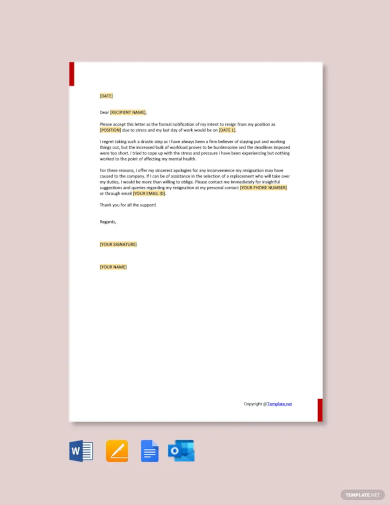
Free Immediate Resignation Letter For New Job Template
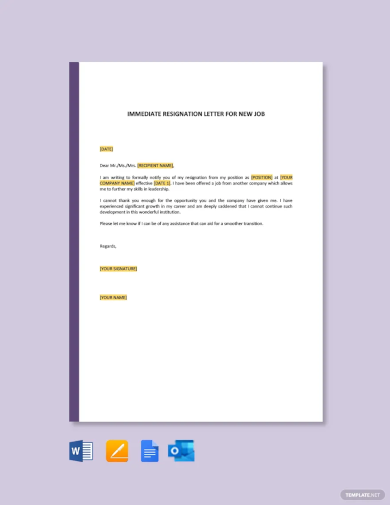
Free Immediate Resignation Letter Due To Pregnancy Reason Template
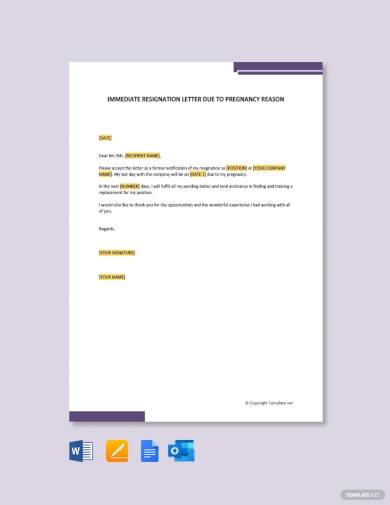
Free Immediate Resignation Letter due to Pregnancy Complications Template
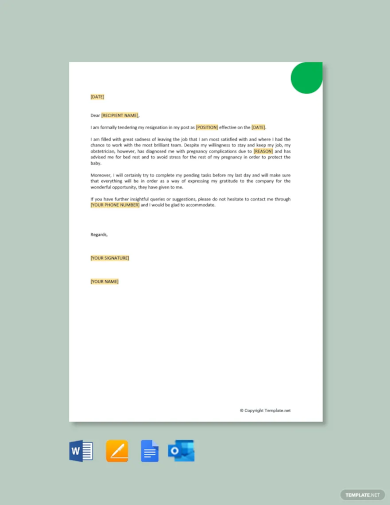
Free Resignation Acceptance Letter With Immediate Effect Template
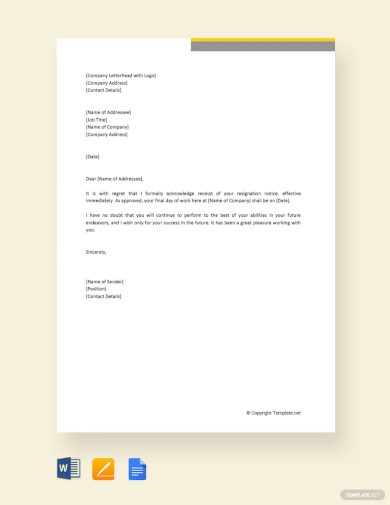
Free Short Resignation Letter Effective Immediately Template
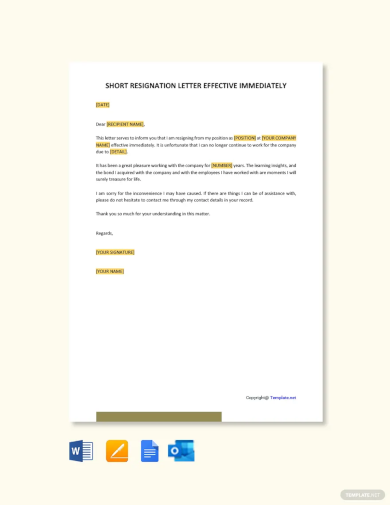
Free Resignation Letter With Reason Effective Immediately Template
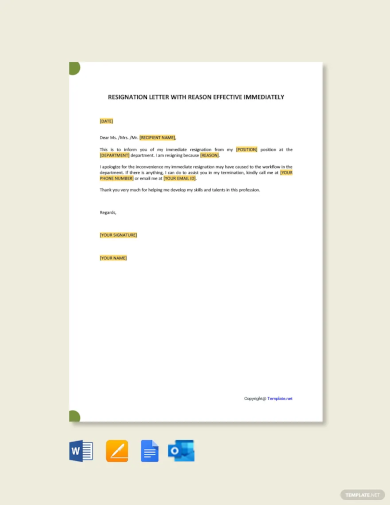
Free Resignation Letter Due to Pregnancy Effective Immediately Template
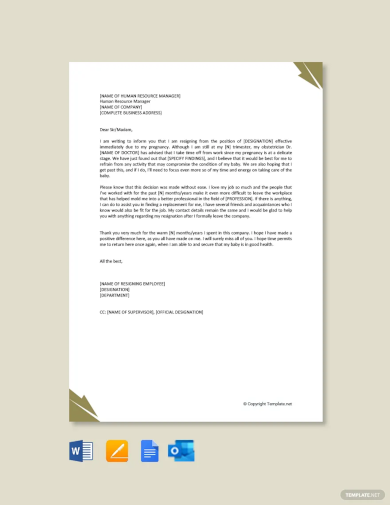
Immediate Resignation Letter Example
Formal Immediate Resignation Letter Example
Immediate Resignation Letter due to Health Reasons Example
How to Write an Immediate Resignation Letter
1. Start with a Formal Letterhead
As this is still a formal letter, always include a formal letterhead in your resignation letter. Ultimately, you should follow and apply business letter format. The letterhead should include your name and your personal contact information, the date, name, position, and office contact information of your employer. It can either be a block left format or have the return address flushed right and the receiver’s address flushed left, both formats are acceptable. For example:
John Smith
324 Elm St.
709 Honey Creek Dr.
New York, NY 10028
May 21, 2017
James Brooks
Owner & Manager
Cleanse Solutions, Inc.
15 St Margarets Lane
New York, NY 10033
2. Add Salutation and Introduction
After formatting the letterhead, you can then insert your salutation. The salutation is a formal or informal greeting. The most commonly used salutation in letters is “Dear …,” After the salutation comes a brief introduction of your letter, this explains the purpose of the letter, in this case, your immediate resignation. It should be made clear in the introduction that you want to resign immediately and the letter is your final resignation letter and not merely a formal notice. The last day of your tenure must be indicated in the introduction and what position are you resigning from. This can go like:
Dear Mr. Brooks,
Due to circumstances beyond my control, as of May 22nd, I can no longer continue working with Cleanse Solutions as Senior Supervisor. I ask that you accept this as formal notice of my immediate resignation.
3. Write Body Paragraphs
The body of your letter must provide further information regarding your immediate formal resignation. It will make your letter fuller while adding a positive light to it. As you are resigning suddenly, it can cause great inconvenience to your employer, therefore, you should not focus on the why you are resigning. Instead, mention something you personally enjoyed or gained while working with the company or organization. Express your gratitude for the opportunities and experiences you have gained and be specific with your praises. You can still include an offer to help with the new arrangements, however, if your time is limited directly indicate it in the letter. For example:
“I would like to extend my humble appreciation for all the opportunities and experiences given to me during my time working with the company. Your direction and support are the two leading factors that make Cleanse Solutions a successful business. Your management skills and the great client relationships that your business has maintained over the years have made this one of the best working environments that I have ever enjoyed. You may also see what is a resignation letter?
It is only after thorough consideration that I have come to this decision, and I regret any inconvenience that it may cause. If I can be of assistance in training my replacement, let me know and I will see what I can do.”
4. Write a Conclusion
You should conclude your letter with a formal sign-off, your signature, and your printed name. You may also include a concluding paragraph as a form of courtesy. You can restate your gratitude towards your employer and extend an invitation to contact you in future if they ever need your assistance. You may also like temporary job resignation letter examples.
As part of the conclusion or closing of your letter, do not forget to include formal closings such as ‘Sincerely,’ ‘Respectfully,’ etc. In addition, do not forget to affix your signature at the bottom left-hand corner of your letter below you closing. You signature formally and officially proves the authenticity of your official letter. Also, affix your position or designation in the company below your printed name along with your contact information. Your letter will then look like this:
“I offer my sincere apologies for not being able to give you any more notice regarding my resignation. If there is any way that I can be of service over the next week, please feel free to contact me at (123) 456-7890.
Sincreley,
Signature
______________
John Smith
Senior Supervisor
(123) 456-7890
Immediate Sample Resignation Letter Due to Illness Example
Immediate Resignation Letter due to Personal Reasons Example
Immediate Resignation Letter due to Harassment Example
Why Should You Write an Immediate Resignation Letter?
Ideally, before an employee resigns he/she must have at least a two weeks notice before tendering his/her formal resignation for the position. When the notice is served, the employer can then start adjusting project responsibilities, recalibrate the team, look for an alternative replacement and just start with the overall transition process. However, there are certain circumstances that don’t allow you and the employer to have at least a two weeks notice before the formal resignation. If the employee is not able to perform and continue to work due to a couple of these legally valid reasons:
- Serious insult by the employer or his representative on the honor and person of the employee;
- Inhuman and unbearable treatment accorded the employee by the employer or his representative;
- Commission of a crime or offense by the employer or his representative against the person of the employee or any of the immediate members of his family; and
- Other causes analogous to any of the foregoing.
These reasons are covered under the Article 285 of the Labor Code in the Philippines, however, before you decide to immediately resign you must first be familiar with the Labor Code in your state to avoid legal sanctions. You may also see writing a heartfelt resignation letters.
FAQs
Can I Resign Without Notice Period?
Yes, you can resign without a notice period under certain circumstances, such as personal emergencies or immediate employment offers. However, this might breach your contract, potentially leading to legal implications or loss of benefits.
What Is A Valid Reason For Immediate Resignation?
Valid reasons for immediate resignation include severe health issues, unsafe work conditions, family emergencies, or significant personal distress. These reasons justify leaving without the standard notice period.
Can I Take Immediate Resignation?
Yes, immediate resignation is possible, particularly in situations involving personal well-being, safety concerns, or other urgent matters. It’s advisable to communicate clearly and professionally with your employer.
How Do I Resign From A Job Peacefully?
To resign peacefully, notify your employer in advance, provide a well-written resignation letter, offer to assist during the transition, and express gratitude for the opportunity. Maintain professionalism to ensure a positive departure.
What Is The Supreme Court Judgement On Notice Period?
The Supreme Court has ruled that employers can seek damages if employees leave without serving the notice period, emphasizing the contract’s terms. However, this varies by case and jurisdiction.
What Happens If I Resign And Don’t Give Notice?
Resigning without notice can lead to forfeiture of benefits, negative references, and potential legal action for breach of contract. It’s crucial to understand the consequences outlined in your employment agreement.
Can We Resign Without Any Reason?
Yes, you can resign without providing a reason. However, offering a concise, polite explanation is courteous and professional, helping maintain positive relationships and possibly assisting in smooth transition processes.
Can A Company Reject A Resignation?
Legally, a company cannot reject a resignation. Once submitted, the resignation process begins. However, employers can negotiate terms or request a longer notice period based on the company’s policies and the employee’s role.
In conclusion, this is not a perfect world and although it is always ideal to serve at least a two weeks notice before officially leaving the company that may not be the case all the time. In case a situation forbids you to do a two-week notice, submit a resignation letter for immediate effectivity. Always specify the date but do not go into details on the reason why you are resigning. We hope we were able to help you with whatever you needed to know about immediate resignation letters.


